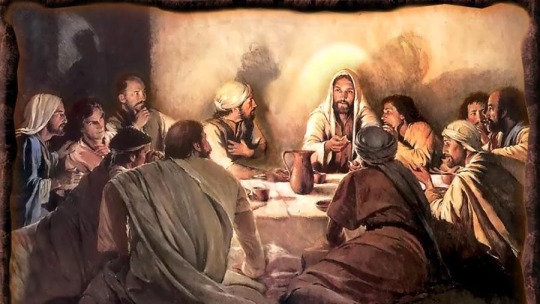#John 7:2-5
Text
The Reluctant Brothers Who Didn't Believe
As we’ve been talking about eyewitnesses around the life of Jesus, there is a small group that bears consideration. Think about his own brothers. They saw him every day growing up, and knew him well. The few glimpses we get of them suggest that they had concerns about their eldest brother. Mark 3:21 says that as Jesus’ ministry began to draw crowds, “[his family] went to take charge of him, for…

View On WordPress
#Acts 1:14#brothers#James 2:1#James 5:9#Jesus#John 10:20#John 7:2-5#Jude 1#Jude v 21#Luke 2:48-50#Mark 3:21#Mark 6:3#Matthew 1:28#Matthew 13:57
0 notes
Text
since official lionsgate confirmed bi john kramer, had to make this

happy bi visibility month to our peepaw
#saw#sawposting#saw franchise#saw movies#saw 2004#john kramer#tobin bell#saw 2#saw 3#saw 4#saw 5#saw 6#saw 7#saw 3d#jigsaw
3K notes
·
View notes
Text
Jigsaw wears the pig mask because he doesn’t want anyone to see Billy is underneath it controlling him like Ratatouille
#saw 2004#adam faulkner stanheight#adam stanheight#amanda young#john kramer#lawrence gordon#mark hoffman#saw#saw movies#sawposting#peter strahm#lindsey perez#saw 2#saw 3#saw 4#saw 5#saw 6#saw 7#saw 3d#saw ii#saw iii#saw iv#saw v#saw vi#saw vii
453 notes
·
View notes
Text
So, I wrote my last semester English Final on why Saw isn't torture porn. Yes I got an 100

#raekiez writing#academic writing#saw#saw 2004#saw franchise#saw 2#saw 3#saw 4#saw 5#saw 6#saw 7#jigsaw#spiral#saw x#saw xi#john kramer#tobin bell#amanda young#lawrence gordon#william easton#adam faulker stanheight#adam faulkner stanheight#leigh whannel#james wan#genuinely what got me into writing again
41 notes
·
View notes
Text
Who followed johns ideals the best?
#saw#amanda young#jigsaw#saw 2004#saw franchise#saw movies#john kramer#saw amanda#logan nelson#mark hoffman#lawrence gordon#saw 2#saw 3#saw 7#saw v#saw 5#saw 6#saw 4#saw the final chapter#saw 3d
80 notes
·
View notes
Text
"I remember a time when everyone
I loved hated me
because I hated them. So what,
so what, so fucking what.
I remember a time when belly
buttons were knee high
When only shitting was dirty
and everything else clean
and beautiful.
I can't remember anything
without a sadness
so deep that it hardly
becomes known to me.
so deep that its tears
leave me a spectator
of my own STUPIDITY
And so I go rambling
on with a hey nonny
nonny no.
How long can one go on writing and writing like you. I now don't really know who I'm writing to or why its quiet [sic] peculiar. I usually write like this and forget about it, but if I post it it's like a little part of my almost secret self in the hands of someone miles away who will wonder what the hell is going on or just pass it off as toilet paper. Anyway I don't care really what happens because when I think about it, its so bloody unimportant – but what is important, who has the right to say that this letter is not important and Jesus is a something anyway – in any way – anyway – Yeah! I wonder what it would be like to be a cretin or something. I bet its great. Er how are you keeping, Stuart old chap. Are you OK – is life good – bad, shite, great – wonderful as it was or is it just a thousand years of nothing, and coalmen on and on and on.
I think this is it
Goodbye Stu don't write out of – er, what's it? Well, not because you think you ought to. Write when you feel like.
So goodbye (from John. You know, the one with glasses)
ANYWAY
BYE BYE
See you soon.
I don't know why I said that."
– An unsent letter from John Lennon for Stuart Sutcliffe (1961)
#i couldnt find the entire letter in a post so here it is because i need to go insane quickly#1) his thing where he emulates people he loves & he literally admits to it here but gives up because Stu's writing style tires him out :(#2) “my almost secret self” and that entire bit about sending off a bit of himself into the world is SO REAL#(I really think Stu becoming his pen pal he never had to see allowed John to let his guard down in a way he couldn't with people IRL#in the same way it can be easier to open up online nowadays)#3) “You know the one with glasses” I LOVE HIM!!!!!!!!!#4) the jokey deflection from his genuine sadness when he calls Stu “old chap”#5) spiralling through his own thoughts and ending with “– Yeah!” hes a tumblrina fr#6) it makes my heart ache that I'm pretty sure the phrase he was looking for was “a sense of obligation” and I wanna tell him :(#7) the “See you soon. I don't know why I said that.” is haunting when I'm pretty sure he never saw Stu again.#ref#john#fiona.docx#61#sjw
162 notes
·
View notes
Text

#90s kid problems#sometimes it's still so mesmerising to me#like you can just open youtube#and watch your obsessions like 24/7#no need to hunt for another vhs across the whole damn country#or to wait for a 2-second clip on your tv at 5 am or something#just wow#the beatles#john lennon#russian memes#russian tv
8 notes
·
View notes
Text
9 the cartoon movie was the dark version of Toy Story and Transformers by Michael Bay because the Dolls came Life and fighting against the machines
#shane acker's 9#9 movie#9#7#5#1#3 and 4#6#8#2#elijah wood#jennifer connelly#john c reilly#christopher plummer#fred tatasciore#crispin glover#martin landau#the scientist#alan oppenheimer
6 notes
·
View notes
Text









Some of my favourite endings to poems :) ❤
#Hi tash 1. a little tooth by thomas lux 2. dream song 29 by john berryman 3. want by joan larkin 4. end of poetry by ada limon 5. when i say#loving me is kind of like being a chicago bulls fan by hanif abdurraqib 6. love and the deli counter by jill mcdonough#7. good bones by maggie smith 8. jessica tells me to take a chill pill by angie sijun lou 9. novel by arthur rimbaud
13 notes
·
View notes
Text
yeah well what if i bought every book where miral had a speaking role what then.
#i bought one already contemplating getting the rest. that whole family is fascinating to me#things ive learned btw: 1. she talks with her mouth full 2. licks her fingers after 3. can survive in the woods alone for months#4. knowledge of folk medicine 5. thinks a sense of humor is overrated#6. never insulted humanity and doesnt think badly of them despite. gestures vaguely at john torres 7. gives good hugs. touchy feely#Explodes. they never explain what happened with their marriage which im dying to know but yknow. <- belly up in the water
9 notes
·
View notes
Text

“Remember your leaders who taught you the word of God. Think of all the good that has come from their lives, and follow the example of their faith.” —Hebrews 13:7 (NLT)
“But those who obey God’s word truly show how completely they love him. That is how we know we are living in him.” —1 John 2:5 (NLT)
“The Bible is Alive” Devotional By YouVersion - Day 4: “The Bible Empowers Us”:
“Imagine introducing yourself to someone from a different country by telling them you belong to a people group whose name means “babblers.” That’s what the name “Popoluca” means, and it’s associated with an indigenous people and language of Veracruz, Mexico.
To this day, “Popoluca” is still used to describe the 35,500 people within that region who speak that language. Those who speak it though, call it “Nuntajɨ̱yi”— “the Straight Speech.”
While Nuntajɨ̱yi may seem insignificant to some, those who can now read or listen to the New Testament in their language understand it matters to the One who created it. Carolina is one of these people. A granddaughter of the translator of the Popoluca New Testament, Carolina is the first Popoluca woman to graduate from college. She has dedicated her life to sharing God’s Word in her language, and is now leading a team translating 50 of the Psalms.
“When we read the Bible in Spanish, it seems like a wasted effort. But when we read it in our language, it arrives all the way to our heart. It touches our hearts—it moves us—because we can really understand it.”
Carolina is an active part of the YouVersion Community, and she regularly uses YouVersion to study and share God’s Word in Nuntajɨ̱yi.
“We’re very happy you’ve put our words into your app, because now anyone in the world can see it—our language is right there with well-known languages! So often our language is not seen as valued, but in this app, it is clear that our language is highly valued.”
Today, take a moment to thank God you have the Bible in your language. Thank God for Carolina and thousands of other Bible translators working around the world today. Because of their faithfulness and passion, God’s Word continues to spread throughout every area on earth, transforming the identities of the people who hear and understand it.”
#hebrews 13:7#1 john 2:5#bible#christian blog#god#belief in god#faith in god#jesus#belief in jesus#faith in jesus#bible verses#bible truths#bible scriptures#bible quotes#bible study#christian devotionals#christian life#christian faith#christian living#christian inspiration#christianity#christian motivation#christian encouragement#christian quotes#youversion#encouragement#spread the word#keep the faith#make him known
20 notes
·
View notes
Photo

Would anyone really believe that Heihachi is Dead at this point????
(also rip daisuke gori...)
#tekken#tekken 2#tekken 3#tekken 4#tekken 5#tekken 6#tekken 7#tekken 8#tekken 1#memes#tekken memes#mishima#heihachi#meme#kazuya#namco bandai#john cena#heihachi mishima#kazuya mishima#tekken meme
9 notes
·
View notes
Text
"CONFRONTING THE ENEMY'S TACTICS!"
Psalm 144:1, “Blessed be the Lord, my Rock and my keen and firm Strength, Who teaches my hands to war and my fingers to fight” (AMPC)
The main tactic of the enemy is deception. “Deception” is defined as, “the act of causing someone to accept as true or valid what is false or invalid; to trick; to cheat; to defraud; to be dishonest.” And that’s exactly who the enemy is, a deceiver, liar and the…

View On WordPress
#1 John 1:5#Believers#Bible#Chef Shermaine#Church#Deception#Encouragement#Faith#Galatians 3:16-29#Genesis 3:1-7#God#Holy Spirit#Isaiah 9:6-7#Jesus Christ#John 10:10#John 8:44#Luke 1:31-33#Matthew 2:1-18#Psalm 119:105#Psalm 144:1#Psalm 18:31-42#Scripture#Word of God
3 notes
·
View notes
Text
youtube
Die Hard: Nakatomi Plaza
#die hard#die hard 2#die hard 3#die hard 4#die hard 5#die hard 6#die hard 7#die hard with a vengeance#die hard trilogy#die hard dice#john mctiernan#john mcclane#bruce willis#hans gruber#nakatomi plaza#nakatomi building#nakatomi hotel#Youtube
0 notes
Text
Nine Biblical Reasons to Reject Donald Trump as a Candidate for President
Wednesday is for Political Controversy
I don’t want to write this post.
Despite the fact that I wrote a book with the title Picking a President or Any Other Elected Official, I’m not a really political person.
I’m a registered Independent. Have been all my life. I wish all Christians were registered Independents. I don’t think it is wise for Christians to be identified with either or any…

View On WordPress
#1 Kings 12#1 Timothy 5:6-7#Donald Trump#Election#James 1:20#John 8:44#Philippians 2:15#Politics#Presidential Candidates#Proverbs 12:15#Proverbs 18:2#Proverbs 19:1#Proverbs 26:12#Proverbs 29:11#Proverbs 29:20#Proverbs 8:44
0 notes
Text
A Guide to Historically Accurate Regency-Era Names

I recently received a message from a historical romance writer asking if I knew any good resources for finding historically accurate Regency-era names for their characters.
Not knowing any off the top of my head, I dug around online a bit and found there really isn’t much out there. The vast majority of search results were Buzzfeed-style listicles which range from accurate-adjacent to really, really, really bad.
I did find a few blog posts with fairly decent name lists, but noticed that even these have very little indication as to each name’s relative popularity as those statistical breakdowns really don't exist.
I began writing up a response with this information, but then I (being a research addict who was currently snowed in after a blizzard) thought hey - if there aren’t any good resources out there why not make one myself?
As I lacked any compiled data to work from, I had to do my own data wrangling on this project. Due to this fact, I limited the scope to what I thought would be the most useful for writers who focus on this era, namely - people of a marriageable age living in the wealthiest areas of London.
So with this in mind - I went through period records and compiled the names of 25,000 couples who were married in the City of Westminster (which includes Mayfair, St. James and Hyde Park) between 1804 to 1821.
So let’s see what all that data tells us…
To begin - I think it’s hard for us in the modern world with our wide and varied abundance of first names to conceive of just how POPULAR popular names of the past were.
If you were to take a modern sample of 25-year-old (born in 1998) American women, the most common name would be Emily with 1.35% of the total population. If you were to add the next four most popular names (Hannah, Samantha, Sarah and Ashley) these top five names would bring you to 5.5% of the total population. (source: Social Security Administration)
If you were to do the same survey in Regency London - the most common name would be Mary with 19.2% of the population. Add the next four most popular names (Elizabeth, Ann, Sarah and Jane) and with just 5 names you would have covered 62% of all women.
To hit 62% of the population in the modern survey it would take the top 400 names.
The top five Regency men’s names (John, William, Thomas, James and George) have nearly identical statistics as the women’s names.
I struggled for the better part of a week with how to present my findings, as a big list in alphabetical order really fails to get across the popularity factor and also isn’t the most tumblr-compatible format. And then my YouTube homepage recommended a random video of someone ranking all the books they’d read last year - and so I present…
The Regency Name Popularity Tier List
The Tiers
S+ - 10% of the population or greater. There is no modern equivalent to this level of popularity. 52% of the population had one of these 7 names.
S - 2-10%. There is still no modern equivalent to this level of popularity. Names in this percentage range in the past have included Mary and William in the 1880s and Jennifer in the late 1970s (topped out at 4%).
A - 1-2%. The top five modern names usually fall in this range. Kids with these names would probably include their last initial in class to avoid confusion. (1998 examples: Emily, Sarah, Ashley, Michael, Christopher, Brandon.)
B - .3-1%. Very common names. Would fall in the top 50 modern names. You would most likely know at least 1 person with these names. (1998 examples: Jessica, Megan, Allison, Justin, Ryan, Eric)
C - .17-.3%. Common names. Would fall in the modern top 100. You would probably know someone with these names, or at least know of them. (1998 examples: Chloe, Grace, Vanessa, Sean, Spencer, Seth)
D - .06-.17%. Less common names. In the modern top 250. You may not personally know someone with these names, but you’re aware of them. (1998 examples: Faith, Cassidy, Summer, Griffin, Dustin, Colby)
E - .02-.06%. Uncommon names. You’re aware these are names, but they are not common. Unusual enough they may be remarked upon. (1998 examples: Calista, Skye, Precious, Fabian, Justice, Lorenzo)
F - .01-.02%. Rare names. You may have heard of these names, but you probably don’t know anyone with one. Extremely unusual, and would likely be remarked upon. (1998 examples: Emerald, Lourdes, Serenity, Dario, Tavian, Adonis)
G - Very rare names. There are only a handful of people with these names in the entire country. You’ve never met anyone with this name.
H - Virtually non-existent. Names that theoretically could have existed in the Regency period (their original source pre-dates the early 19th century) but I found fewer than five (and often no) period examples of them being used in Regency England. (Example names taken from romance novels and online Regency name lists.)
Just to once again reinforce how POPULAR popular names were before we get to the tier lists - statistically, in a ballroom of 100 people in Regency London: 80 would have names from tiers S+/S. An additional 15 people would have names from tiers A/B and C. 4 of the remaining 5 would have names from D/E. Only one would have a name from below tier E.
Women's Names
S+ Mary, Elizabeth, Ann, Sarah
S - Jane, Mary Ann+, Hannah, Susannah, Margaret, Catherine, Martha, Charlotte, Maria
A - Frances, Harriet, Sophia, Eleanor, Rebecca
B - Alice, Amelia, Bridget~, Caroline, Eliza, Esther, Isabella, Louisa, Lucy, Lydia, Phoebe, Rachel, Susan
C - Ellen, Fanny*, Grace, Henrietta, Hester, Jemima, Matilda, Priscilla
D - Abigail, Agnes, Amy, Augusta, Barbara, Betsy*, Betty*, Cecilia, Christiana, Clarissa, Deborah, Diana, Dinah, Dorothy, Emily, Emma, Georgiana, Helen, Janet^, Joanna, Johanna, Judith, Julia, Kezia, Kitty*, Letitia, Nancy*, Ruth, Winifred>
E - Arabella, Celia, Charity, Clara, Cordelia, Dorcas, Eve, Georgina, Honor, Honora, Jennet^, Jessie*^, Joan, Joyce, Juliana, Juliet, Lavinia, Leah, Margery, Marian, Marianne, Marie, Mercy, Miriam, Naomi, Patience, Penelope, Philadelphia, Phillis, Prudence, Rhoda, Rosanna, Rose, Rosetta, Rosina, Sabina, Selina, Sylvia, Theodosia, Theresa
F - (selected) Alicia, Bethia, Euphemia, Frederica, Helena, Leonora, Mariana, Millicent, Mirah, Olivia, Philippa, Rosamund, Sybella, Tabitha, Temperance, Theophila, Thomasin, Tryphena, Ursula, Virtue, Wilhelmina
G - (selected) Adelaide, Alethia, Angelina, Cassandra, Cherry, Constance, Delilah, Dorinda, Drusilla, Eva, Happy, Jessica, Josephine, Laura, Minerva, Octavia, Parthenia, Theodora, Violet, Zipporah
H - Alberta, Alexandra, Amber, Ashley, Calliope, Calpurnia, Chloe, Cressida, Cynthia, Daisy, Daphne, Elaine, Eloise, Estella, Lilian, Lilias, Francesca, Gabriella, Genevieve, Gwendoline, Hermione, Hyacinth, Inez, Iris, Kathleen, Madeline, Maude, Melody, Portia, Seabright, Seraphina, Sienna, Verity
Men's Names
S+ John, William, Thomas
S - James, George, Joseph, Richard, Robert, Charles, Henry, Edward, Samuel
A - Benjamin, (Mother’s/Grandmother’s maiden name used as first name)#
B - Alexander^, Andrew, Daniel, David>, Edmund, Francis, Frederick, Isaac, Matthew, Michael, Patrick~, Peter, Philip, Stephen, Timothy
C - Abraham, Anthony, Christopher, Hugh>, Jeremiah, Jonathan, Nathaniel, Walter
D - Adam, Arthur, Bartholomew, Cornelius, Dennis, Evan>, Jacob, Job, Josiah, Joshua, Lawrence, Lewis, Luke, Mark, Martin, Moses, Nicholas, Owen>, Paul, Ralph, Simon
E - Aaron, Alfred, Allen, Ambrose, Amos, Archibald, Augustin, Augustus, Barnard, Barney, Bernard, Bryan, Caleb, Christian, Clement, Colin, Duncan^, Ebenezer, Edwin, Emanuel, Felix, Gabriel, Gerard, Gilbert, Giles, Griffith, Harry*, Herbert, Humphrey, Israel, Jabez, Jesse, Joel, Jonas, Lancelot, Matthias, Maurice, Miles, Oliver, Rees, Reuben, Roger, Rowland, Solomon, Theophilus, Valentine, Zachariah
F - (selected) Abel, Barnabus, Benedict, Connor, Elijah, Ernest, Gideon, Godfrey, Gregory, Hector, Horace, Horatio, Isaiah, Jasper, Levi, Marmaduke, Noah, Percival, Shadrach, Vincent
G - (selected) Albion, Darius, Christmas, Cleophas, Enoch, Ethelbert, Gavin, Griffin, Hercules, Hugo, Innocent, Justin, Maximilian, Methuselah, Peregrine, Phineas, Roland, Sebastian, Sylvester, Theodore, Titus, Zephaniah
H - Albinus, Americus, Cassian, Dominic, Eric, Milo, Rollo, Trevor, Tristan, Waldo, Xavier
# Men were sometimes given a family surname (most often their mother's or grandmother's maiden name) as their first name - the most famous example of this being Fitzwilliam Darcy. If you were to combine all surname-based first names as a single 'name' this is where the practice would rank.
*Rank as a given name, not a nickname
+If you count Mary Ann as a separate name from Mary - Mary would remain in S+ even without the Mary Anns included
~Primarily used by people of Irish descent
^Primarily used by people of Scottish descent
>Primarily used by people of Welsh descent
I was going to continue on and write about why Regency-era first names were so uniform, discuss historically accurate surnames, nicknames, and include a little guide to finding 'unique' names that are still historically accurate - but this post is already very, very long, so that will have to wait for a later date.
If anyone has any questions/comments/clarifications in the meantime feel free to message me.
Methodology notes: All data is from marriage records covering six parishes in the City of Westminster between 1804 and 1821. The total sample size was 50,950 individuals.
I chose marriage records rather than births/baptisms as I wanted to focus on individuals who were adults during the Regency era rather than newborns. I think many people make the mistake when researching historical names by using baby name data for the year their story takes place rather than 20 to 30 years prior, and I wanted to avoid that. If you are writing a story that takes place in 1930 you don’t want to research the top names for 1930, you need to be looking at 1910 or earlier if you are naming adult characters.
I combined (for my own sanity) names that are pronounced identically but have minor spelling differences: i.e. the data for Catherine also includes Catharines and Katherines, Susannah includes Susannas, Phoebe includes Phebes, etc.
The compound 'Mother's/Grandmother's maiden name used as first name' designation is an educated guesstimate based on what I recognized as known surnames, as I do not hate myself enough to go through 25,000+ individuals and confirm their mother's maiden names. So if the tally includes any individuals who just happened to be named Fitzroy/Hastings/Townsend/etc. because their parents liked the sound of it and not due to any familial relations - my bad.
I did a small comparative survey of 5,000 individuals in several rural communities in Rutland and Staffordshire (chosen because they had the cleanest data I could find and I was lazy) to see if there were any significant differences between urban and rural naming practices and found the results to be very similar. The most noticeable difference I observed was that the S+ tier names were even MORE popular in rural areas than in London. In Rutland between 1810 and 1820 Elizabeths comprised 21.4% of all brides vs. 15.3% in the London survey. All other S+ names also saw increases of between 1% and 6%. I also observed that the rural communities I surveyed saw a small, but noticeable and fairly consistent, increase in the use of names with Biblical origins.
Sources of the records I used for my survey:
Ancestry.com. England & Wales Marriages, 1538-1988 [database on-line].
Ancestry.com. Westminster, London, England, Church of England Marriages and Banns, 1754-1935 [database on-line].
#history#regency#1800s#1810s#names#london#writing resources#regency romance#jane austen#bridgerton#bridgerton would be an exponentially better show if daphne's name was dorcas#behold - the reason i haven't posted in three weeks
10K notes
·
View notes